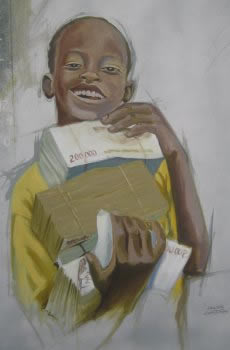This week marks the 50th anniversary of the assassination of Patrice Lumumba. He was only 35 when he died, but in his comparatively short life, he managed not simply to help what is now the Democratic Republic of Congo gain independence from Belgium, but he inspired an idea.
Lumumba’s political career was not very long. He was Prime Minister of the Republic of Congo for almost three months before he was deposed in a coup during the Congo Crisis, and then murdered. The exact details surrounding his death are not clear, but the Belgian government and the CIA were implicated. In 2002 the Belgian government formally apologised to the Congolese people for Lumumba’s murder.
Lumumba is an African icon because he stood steadfast in his belief that the African people had a right to determine their destiny without interference. At Congo’s Independence, the Belgian monarch made it clear in his remarks that he expected Belgium to play a leading role in the Congo’s future, and Lumumba stood defiant in the face of Imperialism:
‘No Congolese worthy of the name will ever be able to forget that it is by struggle that we have won [our independence], a struggle waged each and every day, a passionate idealistic struggle, a struggle in which no effort, privation, suffering, or drop of our blood was spared. We will count not only on our enormous strength and immense riches but on the assistance of numerous foreign countries whose collaboration we will accept if it is offered freely and with no attempt to impose on us an alien culture of no matter what nature’.
Lumumba understood then that while Congo, as did other African countries subsequent to that, had achieved political independence, it was yet to gain economic freedom. It was because he was a threat to colonial interests that sought to maintain their economic relationship with postcolonial African countries that Lumumba was enough of a threat to be assassinated. More than anything Lumumba struggled against “an institutionalised relationship between Africans and Europeans,” in all it’s forms, which facilitated the exploitation of Africans and their resources. As he did then Lumumba represents the idea of unencumbered self-determination, the idea that Africans can truly be free.
In an article titled Lumumba’s ideals and the symbolism of his life, Lyn Ossome writes:
Today due to greed powered by its own African neighbours, who under the watchful eye of the United Nations continue to fuel ethnic conflicts and amass far too many civilian casualties, the country lies in political, economic and social tatters. The paranoid miscalculations of the U.S. and its allies during the Cold War cost Africa many inspiring leaders and perpetuated conflict in a number of countries that have paid long and hard, among them Eritrea, Ethiopia, Sudan, Mozambique, and the DRC. In Sudan, a long civilian war robbed Southern Sudan of its economic soul for more than two decades, and the semi-autonomous region that stands poised to secede from its northern counterpart today is one that is desperately clinging to the hope of Pan-African solidarity and visionary, steadfast leadership. At the contentious heart of its secession lies its enormous mineral wealth, caught within the same cross-hairs of imperialist interests and intervening African interests against which Lumumba struggled until his death.










